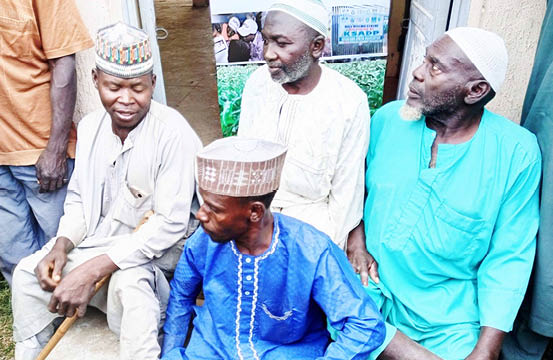PWDs in Kano moving from begging to agriculture
Several attempts by authorities have been made to eradicate the menace of street begging in Kano State but these attempts and measures were not effective as the act still continues, especially among People With Disabilities (PWDs). Malam Khalid Muhammad Tudun Wada is a 67-year-old cripple from Tudun Wada Local Government Area who spent years on […]

A group of PWDs farmers in Tudun Wada local government area of Kano State
Several attempts by authorities have been made to eradicate the menace of street begging in Kano State but these attempts and measures were not effective as the act still continues, especially among People With Disabilities (PWDs).
Malam Khalid Muhammad Tudun Wada is a 67-year-old cripple from Tudun Wada Local Government Area who spent years on the streets begging for alms within and outside Kano State. However, in the last four years, Malam Khalid no longer begs as he and other people living with disabilities are currently engaged in agriculture after accepting to go back to the farms.
Narrating his transition from a street beggar to becoming a farmer, Malam Khalid revealed that an agricultural extension worker introduced him to the new techniques in agriculture which he accepted and that has changed his life for the better.
“It isn’t that I have not been farming, but as you can see, I can’t walk, I am crippled and therefore there is a limit to what I can physically do. It was a normal routine for us here to do the little we can on our farms during the wet season, and during the dry season, we go out to the cities to beg on the streets. That all stopped after an agricultural extension worker educated me on the newly adopted techniques introduced by the Kano State Agro-Pastoral Development Project (KSADP) and implemented by Sasakawa Africa Association (SAA). Under the project, we were trained to form groups and through the group, we were empowered with agro inputs. The results were so encouraging and since then, we stopped going out to beg,” he said.
He further explained that they were encouraged to form an association which he once served as its chairman, adding that the association is now fully registered with bank accounts, adding that the association has over 25 members that have been saving for the association’s prosperity.
“We brought ourselves together and formed a registered association based on the projects advice and as I speak to you, our association has over 25 members meaning that over 25 PWDs in Tudun Wada are no longer on the streets but in the farms earning lawfully; you can only see us in the market but certainly not the streets again,” he revealed.
Another member of the PWDs farmer association Malam Bello Buhari said if the project’s approach to PWDs will be replicated in all the areas with high number of street beggars, the approach will surely succeed in moving many beggars out of the streets as they will be more productive and less dependent on others.
Similarly, speaking to beneficiaries of the project during a media field day in Kano, the KSADP Project coordinator in SAA Comrade Abdulrasheed Hamisu Kofar Mata stated that the project which is being funded through a loan facility from the Islamic Development Bank (IsDB) and a grant component from Live and Livelihood Funds (LLF) invested in the development of a sustainable agro-production system in the state, has been active in selected agricultural value chains; rice, maize, sorghum, millet tomato, onions and cabbage.
According to him, the intervention so far has directly targeted and reached 270,000 farmers across the identified value chains from the 44 local government areas of the state, including the PWDs.
According to him, “in collaboration with IITA and ICRISAT and 8 partner seed companies, the project strengthened the seed system by injecting 12 metric tons foundation seeds, 8 metric tons of breeder seeds and 1000metric tons of certified seed,” adding that a total of 588 youths were trained and empowered with the starter kits and Personal Protective Equipment such as sprayers, protecting masks, eye protectors, hand gloves, raincoat and rain boots, who are now gainfully employed in chemical spraying across the state. Evidence of their operations already indicated scaling-up in many locations across the intervention areas.
He added that the main aim of the project is to assist farmers in the transition from farming and sale to the more effective and sustainable form of farming to sell, as farmers were also trained and empowered on nutrition sensitive agriculture to expose them to issues of nutrition and good hygiene, among other series of interventions.
